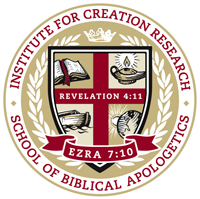Recognition
You are here
Home / RecognitionIs ICR’s School of Biblical Apologetics accredited? The Institute for Creation Research has chosen not to seek accreditation for the following reasons:
- SACS (the Southern Association of Colleges and Schools), the main regional accrediting agency governing the state of Texas, is not friendly toward young-earth biblical-creation institutions.
- Accreditation through TRACS (Transnational Association of Colleges and Schools, which is officially a creationist college accreditor) was “illegal” in Texas during the years when ICR-SOBA was being established. Years later, however, TRACS was deemed “legal” in Texas, but only at the regulatory “discretion” of a secular government agency (THECB), i.e., the same THECB that officially endorsed (and advocated in both federal and state litigation) the evolutionary concepts of a supposed Big Bang, billions of years, and Darwinist biology/origins. By electing First Amendment-based exempt status, rather than by voluntarily playing political accreditation games, ICR-SOBA continues to focus its limited resources on Christian education and apologetics, rather than sacrificing resources to monitor and react to the latest secular education politics.)
- ICR prefers to use its available academic freedoms to stand faithful to its understanding of the truths about God and His creation, as those truths are authoritatively taught in the Holy Bible.
Institutional Academic Freedom versus Accreditation
A frequent question asked of many colleges is “Is your school ‘accredited,’ and if not, why not?” (The question often implies that a “no” answer reveals something about quality,1 rather than something about politics.) ICR’s quick answer to this question is “No, by choice”—and ICR’s strategic mission-related reasons (which include academic freedom and ICR’s longstanding commitment to young-earth biblical creation) for that answer are summarized below.
In short, the pervasive influence of evolution’s domination of higher education controls accreditation politics in America, especially in Texas (where ICR is based), and ICR does not “bow” to evolutionary doctrine, nor does ICR need to seek ‘accreditation’ approval from accreditors who are dominated by old-earth evolutionary thinking. Despite academic peer pressures, ICR prefers to use its available academic freedoms to stand faithful to its understanding of the truths about God and His creation, as those truths are authoritatively taught in the Holy Bible.2
Quick Summary of Accreditation Politics (Applicable to Texas)
To qualify for any kind of college ‘accreditation’ in Texas, a private college may not advertise its accreditation status (with any accrediting agency) unless and until the accrediting agency is officially favored (“approved”) by the Texas state government. Accreditation through TRACS (Transnational Association of Colleges and Schools, which is officially a creationist college accreditor) was “illegal” in Texas during the years when ICR-SOBA was being established.3 Years later, however, TRACS was deemed “legal” in Texas, but only at the regulatory “discretion” of a secular government agency (THECB), i.e., the same THECB that officially endorsed (and advocated in both federal and state litigation) the evolutionary concepts of a supposed Big Bang, billions of years, and Darwinist biology/origins. By electing First Amendment-based exempt status, rather than by voluntarily playing political accreditation games, ICR-SOBA continues to focus its limited resources on Christian education and apologetics, rather than sacrificing resources to monitor and react to the latest secular education politics.
In Texas (and in many other states), apart from the First Amendment/Free Exercise of Religion exemption (which ICR has elected to rely upon), a private college must also have its degree-approved programs (even the program’s curriculum and institutional academic viewpoint) approved by a state government agency, even when the state regulatory agency is dominated by unbelievers and even if the private college is entirely funded by private sources. This form of political regulation of private education is a stark departure from America’s heritage of Bible-based education and private academic freedom.
For example, teaching science education from a biblical creationist viewpoint (for a Master of Science degree program) is unacceptable to the college regulators in Texas (and also in California, where ICR began), and that restraint on academic freedom has been recently confirmed by federal and state court rulings in Texas (and in California).
ICR is now based in Texas, where the THECB fined a Protestant seminary for providing Bible-focused undergraduate and graduate programs without the THECB’s prior approval of the seminary’s textbooks, theological faculty, personnel policies, etc.—even though the seminary’s curriculum was completely founded on teaching the Holy Bible’s doctrines and that Lord Jesus Christ is the only Savior for Adam’s fallen race. Thankfully, the Texas Supreme Court disapproved that conduct of the THECB in a recent ruling4 that discussed how state government approval or rejection of Bible/theology programs is tantamount to establishing government-approved religious education, which violates constitutional restraints on government favoring (“establishing”) one form of private religious education over others. Thus, presently in Texas, there is still recognized an academic freedom for religious higher education that “exempts” any such program from THECB oversight and censorship. ICR’s School of Biblical Apologetics, because its programs are foundationally biblical and theological and apologetic in content, is thus exempt from THECB oversight.
So the question remains: “Although ICR’s School of Biblical Apologetics is exempt from THECB oversight, why is it not ‘accredited’?” Exemption from THECB oversight is one thing, politically speaking, but being allowed to advertise an ‘accredited’ status is another. In Texas, unless a private accrediting association is government-favored, it is deemed illegal by the Texas Higher Education Coordinating Board. As indicated above, the “legality” of an accrediting agency (and its accrediting operations) are deemed to be jurisdictionally subject to the pro-evolutionist politics of the THECB, even if no state or federal government funding is involved. Accordingly, ICR faced a choice when ICR-SOBA was established, how best to promote its core message and mission (as summarized in www.icr.org/tenets), and selected academic freedom and resource stewardship over accreditation politics (see John 5:44-47). ICR has no intention of trading its 45+ years of fidelity to young-earth creation, as taught in the Bible (and as demonstrated by ICR’s foundational tenets—www.icr.org/tenets), and its academic freedom, just to be accepted by an evolutionary-oriented accrediting association (or even by one that errs from Biblical young-earth creation teaching, either in position or in practice) which may be, at the time, favored by the Texas Higher Education Coordinating Board (which is dominated by those who disagree with ICR’s tenets).
In sum, ICR has consciously decided to prefer institutional academic freedom to provide its Master of Christian Education degree program, as well as its other educational programs, in furtherance of ICR’s biblical creation viewpoint (as summarized by ICR’s tenets), rather than compromise with the accreditation politics now operating in Texas.4
This legal perspective on Texas education law is provided by ICR’s special counsel, James J. S. Johnson, with the original of this legal perspective being provided during AD2011.
References
1. For some students, only an “accredited” education is worth undertaking, but for others it is only a factor to be considered.
2. For a summary of ICR’s core beliefs about God and His creation, see www.icr.org/tenets.
3. See Institute for Creation for Research Graduate School v. Texas Higher Education Coordinating Board, 2010 WL 2522529 (W.D. Tex. – Austin 2010) (misnaming of ICR’s graduate school in the original, apparently illustrating a judicial “rush to press”; “academic freedom” is never mentioned in the 39 pages of this federal court ruling).
4. HEB Ministries, Inc. d/b/a Tyndale Theological Seminary v. Texas Higher Education Coordinating Board, 235 S.W.3d 627 (Tex. 2007).
This legal perspective on Texas education law is provided by The Institute for Creation Research’s special counsel, James J. S. Johnson.


